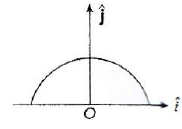Electric Field MCQ (With Solution) Level - 1 : Test 1 - Class 12 MCQ
25 Questions MCQ Test - Electric Field MCQ (With Solution) Level - 1 : Test 1
A wooden block performs SHM on a frictionless surface with frequency v0. The block carries a charge + Q on its surface. If now a uniform electric field E is switched on as shown, then the SHM of the block will be

A few electric field lines for a system of two charges Q1 and Q2 fixed at two different points on the x-axxis are shown in the figure. These lines suggest that

| 1 Crore+ students have signed up on EduRev. Have you? Download the App |
A thin semi-circular ring of radius r has a positive charge q distributed uniformly over it. The net field E at the centre O is

An electron initially at rest falls a distance of 1.5 cm in a uniform electric field of magnitude 2 × 104 N/C. The time taken by the electron to fall this distance is
The electric field created by a point charge falls with distance r from the point charge as
The electric field at the centroid of an equilateral triangle carrying an equal charge q at each of the vertices is
A particle of mass m carrying charge q is kept at rest in a uniform electric field E and then released. The kinetic energy gained by the particle, when it moves through a distance y is
The charge q is projected into a uniform electric field E. work done when it moves a distance Y is
If the linear charge density of a cylinder is 4 µCm-1 then electric field intensity at point 3.6 cm from axis is
A simple pendulum has a length i and the mass of the bob is m. The bob is given a charge q coulomb. The pendulum is suspended between the vertical plates of a charged parallel plate capacitor. If E is the electric field strength between the plates, the time period of the pendulum is given by
Charges + 2q + q and +q are placed at the corners A,B and C of an equilateral triangle ABC. If E is the electric field at the circumcentre O of the triangle, due to the charge +q, then the magnitude and direction of the resulatant electric field at O is
Which of the following configurations of electric lines of force is not possible?
Two unlike charges of the same magnitude Q are placed at a distance d. The intensity of the electric field at the middle point in the line joining the two chages.
The spatial distribution of the electric field due to charges (A, B) is shown in figure. Which one of the following statements is correct?
Two point charges +8q and -2 q are located at x = 0 and x = L respectively, The location of a point on the x-axis at which the net electric field due to these two point charges is zero is
Six charges, three positive and three negative of equal magnitude are to be placed at the vertices of a regular hexagon such that the electric field at O is double the electric field when only one positive charge of same magnitude is placed at R. Which of the following arrangements of charges is possible for P, Q, R, S, T and U respectively?
The electric field at a point due to an electric dipole, on an axis inclined at an angle θ (<90°) to the dipole axis, is perpendicular to the dipole axis, if the angle θ is
A dipole of electric dipole moment p is placed in a uniform electric field of strength E. If θ is the angle between positive directions of p and E, then the potential energy of the electric dipole is largest when θ is
Let Ea be the electric field due to a dipole in its axial plane distance t and let Eq be the field in the equatorial plane distance t ,then the relation between Ea and Eq will be
The relation between the intensity of the electric field of an electric dipole at a distanec r from its centre on its axis and the distance is when (r >> 2t)
An electric dipole of the dipole moment p is placed in a uniform electric field E. The maximum torque experienced by the dipole is
Torque acting on an electric dipole in a uniform electric field is maximum if the angle between p and E is
An electric dopole of length 1 cm is placed with the axis making an angle of 30° to an electric field of strength 104NC-1. If it experiences a torque of 10√2 Nm, the potential energy of the dipole is
If the force exerted by an electric dipole on a charge q at a distance of 1 m is F, the force at a point 2 m away in the same direction will be
Dipole is placed parallel to the electric field. If Q is the work done in rotating the dipole by 60°, then work done in rotating it by 180° is

















